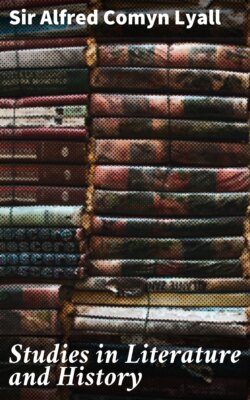Читать книгу Studies in Literature and History - Sir Alfred Comyn Lyall - Страница 8
На сайте Литреса книга снята с продажи.
Оглавление'I woke this morning to find the blow quite ended. The heaven was all a mottled grey; even the East quite colourless. The downward slope of the island veiled in wafts of vapour, blue like smoke; not a leaf stirred on the tallest tree. Only three miles below me on the barrier reef I could see the individual breakers curl and fall, and hear their conjunct roaring rise, like the roar of a thoroughfare close by.'
It is good for the imaginative letter-writer to live within sight and sound of the sea, to hear the long roll, and to see from his window 'a nick of the blue Pacific.' It is also good for him to be within range of savage warfare, and to take long rough rides in a disturbed country. On one such occasion he writes:
'Conceive such an outing, remember the pallid brute that lived in Skerryvore like a weevil in a biscuit, and receive the intelligence that I was rather the better for my journey. Twenty miles ride, sixteen fences taken, ten of the miles in a drenching rain, seven of them fasting and in the morning chill, and six stricken hours' political discussions with an interpreter; to say nothing of sleeping in a native house, at which many of our excellent literati would look askance of itself.'
The feat might not seem miraculous to a captain of frontier irregulars in hard training; but for a delicate novelist in weak health it was pluckily done. These letters would be readable if Stevenson had written nothing else, though of course their worth is doubled by our interest in a man of singular talent who died prematurely. They illustrate the tale of his life and portray his character; and they form an addition, valuable in itself, and unique as a variety, to the series of memorable English letter-writers.
Mr. Colvin mentions, in his preface, that Stevenson's talk was irresistibly sympathetic and inspiring, full of matter and mirth. It cannot be denied that between correspondence and conversation, regarded as fine arts, there is a close kinship; and very similar reasons have been alleged for the common belief that both are on the decline. Whether such a belief has any solid foundation in the case of letter-writing, we may be warranted in doubting. Observations of this sort, which have a false air of acuteness and profundity, are repeated periodically. The remark so constantly made at this moment, that nowadays people read nothing but magazines, was made by Coleridge early in this century; and Southey prophesied the ruin of good letters from the penny post. It is true that the number of letters written must have increased enormously; it is also true that many more are published than heretofore, and that as a great many of these are not above mediocrity, are valueless as literature, and of little worth biographically, they produce on the disappointed reader the effect of a general depreciation of the standard. Nevertheless, this article will have been written to little purpose, unless it has shown fair cause for rejecting such a conclusion, and for maintaining that, although fine letter-writers, like poets, are few and far between, yet they have not been wanting in our own time, and are not likely to disappear. There will always be men, like Coleridge or Carlyle, whose impetuous thoughts and humoristic conceptions cannot perpetually submit to the forms and limitations and delays of printing and publishing, but must occasionally demand instant liberation and prompt delivery by the natural process of private letters. And although the stir and bustle of the world is increasing, so that quiet corners in it are not easily kept, yet it is probable that the race of literary recluses—of those who pass their days in reading books, in watching the course of affairs, and in corresponding with a select circle of friends—will also continue. Whether Englishwomen, who write letters up to a certain point better than Englishmen, will now rise, as Frenchwomen have done, to the highest line, and why they have not done so heretofore, are points that we have no space here for taking up.
But it is the exceptional peculiarity of letters, as a form of literature, that the writer can never superintend their publication. During his lifetime he has no control over them, they are not in his hands; and they do not appear until after his death. He must rely entirely, therefore, upon the discretion of his editor, who has to balance the wishes of a family, or the susceptibilities of an influential party in politics or religion, against his own notions of duty toward a departed friend, or against his artistic inclination toward presenting to the world a true and unvarnished picture of some remarkable personage. He may resolve, as Froude did in the case of Carlyle, that 'the sharpest scrutiny is the condition of enduring fame,' and may determine not to conceal the frailties or the underlying motives which explain conduct and character. He may refuse, as in the case of Cardinal Manning, to set up a smooth and whitened monumental effigy, plastered over with colourless panegyric, and may insist on showing a man's true proportions in the alternate light and shadow through which every life naturally and inevitably passes. But such considerations would lead us beyond our special subject into the larger field of Biography; and we must be content, on the present occasion, with this endeavour to sketch in bare outline the history and development of English letter-writing, and to examine very briefly the elementary conditions that conduce to success in an art that is universally practised, but in which high excellence is so very rarely attained.
